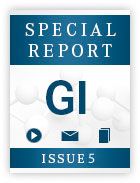Success of Regorafenib Confirmed in Patients With mCRC
Results of a large expanded access program, presented at the 2015 World Congress on GI Cancer, confirmed the efficiency and safety of regorafenib (Stivarga) in previously treated patients with mCRC.
Eric Van Cutsem, MD, PhD
Results of a large expanded access program (EAP), presented at the 2015 World Congress on GI Cancer, confirmed the efficiency and safety of regorafenib (Stivarga) in previously treated patients with metastatic colorectal cancer (mCRC).
In the phase IIIb EAP, which was labeled CONSIGN, the estimated progression-free survival (PFS) with regorafenib was 2.8 months. These data were consistent with the phase III CORRECT trial, which was instrumental in the US Food and Drug Administration (FDA) approval of regorafenib in September 2012. In this study, regorafenib demonstrated a median PFS of 2.0 months compared with 1.7 months with placebo (HR, 0.49; 95% CI, 0.42-0.58;P<.0001). Adverse events (AEs) were similar between the two studies.
“Today we report on safety and progression-free survival in a large cohort of patients that more closely resembles daily clinical practice than the pivotal registration trial,” commented Eric Van Cutsem, MD, PhD, Leuven Cancer Institute, University Hospitals Leuven, Leuven, Belgium. “This study, in a real world population of patients with pretreated mCRC, shows a similar safety profile and progression-free survival with regorafenib as shown in the randomized CORRECT trial."
The CONSIGN study was a prospective, open-label, single-arm investigation that enrolled 2872 patients who progressed after approved standard therapies for mCRC. The EAP enrolled patients from 188 sites located in 25 countries. Patients were administered regorafenib at 160 mg once daily for the first 3 weeks of each 4-week cycle until disease progression, death, or unacceptable toxicity; treatment beyond progression was per investigator’s discretion.
“CONSIGN was initiated to allow patients with mCRC access to regorafenib before marketing authorization and to assess safety, which was the primary endpoint,” Van Cutsem explained. “We began CONSIGN at the suggestion of the authorities and to fulfill the wishes of patients and doctors for a larger expanded access to regorafenib.”
PFS per investigator assessment was the only efficacy variable assessed, with safety as the primary endpoint of the study. The estimated PFS was similar regardless ofKRASwild type and mutant status, at 2.8 and 2.5 months, respectively.
As of data cutoff on January 2, 2015, data from 2864 patients receiving regorafenib were included in the safety analysis. The median patient age was 62 years, 53% of patients had an ECOG PS of 1, and 47% had an ECOG PS of 0.KRASmutations were identified in 51% of patients and nearly all patients (96%) had received ≥2 prior regimens for metastatic disease.
Patients received regorafenib for a median duration of 2.5 months (range, 0-30) at a median daily dose of 160 mg. Regorafenib-related AEs leading to treatment discontinuation occurred in 266 patients (9%), and AEs leading to treatment modification occurred in 1732 patients (60%).
“As of April, 2015, 100 patients remain on treatment at 10 sites across 6 countries,” Van Cutsem noted.
Regorafenib-related AEs of any grade occurred in 2613 patients (91%). Grade >3 AEs occurred in 80% of patients. Grade ≥3 AEs occurred in 1629 patients (57%), serious AEs occurred in 251 patients (9%), and grade 5 AEs were documented in 13 patients (<1%). These rates were similar to those observed in both the treatment and placebo arms of the CORRECT trial of regorafenib.
The most common treatment-related grade ≥3 AEs included hypertension (15%), hand-foot reaction (14%), fatigue (13%), and diarrhea and hypophosphatemia, which occurred equally in 5% of patients. Treatment-emergent hepatic and hematologic laboratory values (irrespective of relation to study drug) of grades ≥3 included increased bilirubin (13%), increased aspartate aminotransferase (AST; 7%), increased alanine aminotransferase (ALT; 6%), anemia (4%), thrombocytopenia (2%), and neutropenia (1%).
One non-fatal case of severe drug-induced liver injury according to International DILI Working Group criteria was reported.
“We need to establish clear guidelines on the management of adverse events to make taking the drug more tolerable for patients,” commented Van Cutsem. “These findings add to our knowledge of how to select patients and how to manage toxicities. The large number of patients makes this a rich dataset that will be important for future evaluations.”
Van Cutsem E, Ciardiello F, Seitz J-F, et al. Results from the large, open-label phase 3b CONSIGN study of regorafenib in patients with previously treated metastatic colorectal cancer.Ann Oncol.2015;26 (suppl 4; LBA-05).

Survivorship Care Promotes Evidence-Based Approaches for Quality of Life and Beyond
March 21st 2025Frank J. Penedo, PhD, explains the challenges of survivorship care for patients with cancer and how he implements programs to support patients’ emotional, physical, and practical needs.
Read More